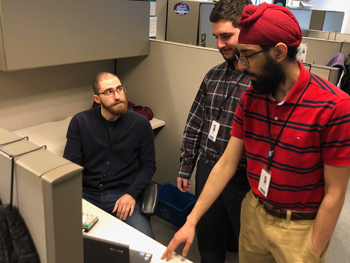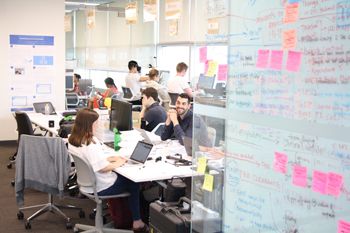Making the learning curve less steep: Unique partnership unites students and staff to innovate

By Ana Gajic

Fourth-year computer science students (l to r) Paul Martins, Issam Fadel and Harmanpreet Bajwa.
Fourth-year computer science students Harmanpreet Bajwa, Issam Fadel, Paul Martins and Stephanie Treacy didn’t expect to learn the ins and outs of a hospital’s medication workflow when they first started their undergraduate careers.
Through a posting sent by the Biomedical Zone – a partnership between Ryerson University and St. Michael’s Hospital – the students signed up for an opportunity to work with the St. Michael’s IT team. Their task: support the development of an electronic medication reconciliation application, eMedRec, which is custom-made for the needs of the hospital.
“You learn a lot from school but you don’t always get to apply that knowledge before you graduate,” Fadel said. “This was a way for us to apply our new knowledge.”
eMedRec optimizes the hospital’s ability to track the medications that patients are on at all vulnerable points of transition in their care: admission, transfer and discharge. It puts all this information into one platform and turns a paper-centred process into a digital one. The application has rolled out for cardiovascular patients with an anticipated rollout to the rest of the hospital in the summer.
The IT team at St. Michael’s turned to the Biomedical Zone to augment its development resources with students from Ryerson, explained Rupert Lugg, manager of Application Services at the St. Michael’s IT team.
“We are very proud to be able to facilitate innovation, not only at St. Michael’s, but also between Ryerson and the hospital,” said Dr. Linda Maxwell, executive director of the Biomedical Zone. “Through partnerships like this one, we offer students an opportunity to embed themselves in the health system and support hospital teams with innovation. Our aim is to create disruption that will make care efficient and seamless.”
For the IT team, the introduction of student colleagues has only improved the development process.
“It’s been great to have the students come in with fresh eyes,” said Erin Dodd, a project manager who works with the IT team. “We’ve been able to customize the platform and tweak it based on what clinicians here need.”

The Biomedical Zone
The Ryerson students were responsible for the development of the majority of the application, Lugg said. The Biomedical Zone supported students with additional learning to ensure they were equipped for the project.
“The Biomedical Zone broke down the learning curve and made it less steep for us,” Bajwa said. “We got exposure to every aspect of development – from design to front-end, back-end. We wouldn’t get that in most places.”
According to Lugg, Ryerson students researched the solutions to medication reconciliation, built mockups of the interface, programmed complex functions, and made sure the system was efficient.
“Their energy is refreshing,” Lugg said. “Most have had little or no exposure to health IT, yet they are able to quickly grasp the concepts and begin contributing quickly.”
Dr. Maxwell noted that this type of partnership fulfills both the university’s commitment to students and the hospital’s dedication to innovation.
“We want to provide work-integrated learning,” she said. “It’s a tall order – but through projects like this one, we can provide high-quality education in a work setting.”
As the students get ready to graduate in the spring, this experience has equipped them with a new toolkit of skills.
“I’ve noticed that a lot of things I’ve learned at work have helped in my studies. I’ve gained a lot of knowledge and I’m now interested in pursuing a health-related career,” Fadel said. “It’s a win-win for all of us.”
About St. Michael’s Hospital
St. Michael’s Hospital provides compassionate care to all who enter its doors. The hospital also provides outstanding medical education to future health care professionals in more than 27 academic disciplines. Critical care and trauma, heart disease, neurosurgery, diabetes, cancer care, care of the homeless and global health are among the Hospital’s recognized areas of expertise. Through the Keenan Research Centre and the Li Ka Shing International Healthcare Education Centre, which make up the Li Ka Shing Knowledge Institute, research and education at St. Michael’s Hospital are recognized and make an impact around the world. Founded in 1892, the hospital is fully affiliated with the University of Toronto.
About Unity Health Toronto
Unity Health Toronto, comprised of Providence Healthcare, St. Joseph’s Health Centre and St. Michael’s Hospital, works to advance the health of everyone in our urban communities and beyond. Our health network serves patients, residents and clients across the full spectrum of care, spanning primary care, secondary community care, tertiary and quaternary care services to post-acute through rehabilitation, palliative care and long-term care, while investing in world-class research and education. For more information, visit www.unityhealth.to.
